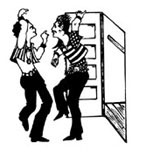
Jack Kerouac’s Creedal Moment
DECLARATION OF HIS CATHOLICISM
It has been called one of the most bizarre panel discussions ever held on television.
Episode 32 of the third season of author and columnist William F. Buckley Jr.’s television talk show Firing Line aired on September 4, 1968. Buckley began by announcing that the episode’s topic would be “the hippies, an understanding of whom we must, I guess, acquire or die painfully.” Buckley’s pain, though not fatal, began soon after his opening monologue. The panel included Beat movement writer Jack Kerouac; sociologist Lewis Yablonsky, author of The Hippie Trip (1968); and poet, musician, and polemicist Ed Sanders.
Buckley, introducing Kerouac, called him a “regular practicing novelist” and referred to his bestselling On the Road (1957) as “seeming to preach a life of disengagement and making a virtue out of restlessness” — an image Kerouac himself would project during the 30 minutes that followed.
Kerouac sat to Buckley’s immediate left. The host, known to lean to the right politically, now physically leaned far-right, anxious to put space between himself and the clearly soused Kerouac. Beat poet Allen Ginsberg, a friend of Kerouac’s who was in the audience, later claimed that when Kerouac arrived at the studio inebriated, Buckley asked him to replace Kerouac on the panel. Ginsberg politely declined.
You May Also Enjoy
Socrates would say that good music is music that makes the soul better, that is, more harmonious, and bad music is music that makes the soul unharmonious.
Poetry was once understood to be an anthropological episteme, a way of knowing, if only through a glass darkly.
In the many stories of saints who followed their inspirations despite the seeming impossibility of what God was asking them to do, He was the source of life for these souls.

